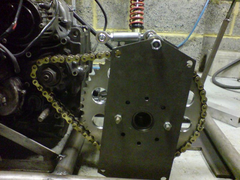iceman26
|
| posted on 1/10/10 at 05:44 PM |

|
|
chain diff
what are the advantages of chain drive over normal diff?
|
|
|
|
|
madteg
|
| posted on 1/10/10 at 06:07 PM |

|
|
Chain diff is driven by a chain and normal diff id driven by a prop.
|
|
|
tomgregory2000
|
| posted on 1/10/10 at 06:22 PM |

|
|
depends where your engine is
|
|
|
blakep82
|
| posted on 1/10/10 at 06:29 PM |

|
|
yep, engines go different ways around
________________________
IVA manual link http://www.businesslink.gov.uk/bdotg/action/detail?type=RESOURCES&itemId=1081997083
don't write OT on a new thread title, you're creating the topic, everything you write is very much ON topic!
|
|
|
Minicooper
|
| posted on 1/10/10 at 06:29 PM |

|
|
1:Light
2:Easy final drive ratio changes
3:Allows engine to be used in it's correct orientation
Can't think of anymore at the moment
Cheers
David
|
|
|
iceman26
|
| posted on 1/10/10 at 06:53 PM |

|
|
what is the recomended shortest run of chain you should have
and has ny one got any picturers of chain diff fitted
thanks
|
|
|
m8kwr
|
| posted on 1/10/10 at 07:04 PM |

|
|
Look at the warner R4 LINK
I have one, but not fitted.
|
|
|
matt_gsxr
|
| posted on 1/10/10 at 07:39 PM |

|
|
Chain length supposedly limited by temperature. I'd like to understand the mechanism of this a bit better.
But have never found anything I could get my teeth into.
|
|
|
blue2cv
|
| posted on 2/10/10 at 08:16 AM |

|
|
If memory serves, when in discusion with Muffet Engineering a few years back, they were getting chain overheat probs when under 40 - 50 links used
(cant remember exact number) had to rethink my design then and ended up using a Nova racing unit, which has a longer chain run, shame as the Muffet
unit was very compact
|
|
|
MikeRJ
|
| posted on 2/10/10 at 08:47 AM |

|
|
quote:
Originally posted by matt_gsxr
Chain length supposedly limited by temperature. I'd like to understand the mechanism of this a bit better.
The shorter the chain the more frequently each link has to articulate to go around the sprockets which generates heat. Couple this with lower mass
and surface area with which to dissipate the heat and shorter chains end up running hotter.
The smaller the sprockets the more the heat and wear, which is why increasing the number of teeth on the rear sprocket of a bike is preferable to
losing teeth off the front one.
|
|
|
Mark Allanson
|
| posted on 2/10/10 at 08:49 AM |

|
|
Has anyone tried using a belt instead of a chain? I thing the big Harley Fergusons use them so heavy duty ones must be available.
If you can keep you head, whilst all others around you are losing theirs, you are not fully aware of the situation
|
|
|
cloudy
|
| posted on 2/10/10 at 10:37 AM |

|
|
Here's a pic from early in my build, I wouldn't go much shorter than this - I think you'll have overheating issues as mentioned
above...
 
chainlength
www.warnercars.com
|
|
|
blue2cv
|
| posted on 2/10/10 at 10:42 AM |

|
|
I did look into belts too, again if mem serves couldnt find right combination of size and power handling for my set up
|
|
|
JF
|
| posted on 2/10/10 at 11:02 AM |

|
|
Belts could be a nice option. But are harder to source and therefor might work out more expensive.
Chains and sprockets are plentifull in the bikeworld. And easy to adapt, you can make them to length relatively easy.
For belts you will more or less depending on the standard sizes avaible. pulleys are harder to source too, although they wear much less. So if you do
get it sorted properly it will probably outlive the rest of the car.
Personaly I would look into using an aditional sprocket/pulley when designing such short drivetrains. To increase the wrap around the smallest
sprocket. As more links will take the force, there should be significantly less wear on the chain and small sprocket (wich will always wear much
faster then the larger one).
Although looking at cloudy's pic it might be hard fitting one in with his setup. A few cm might make all the differance though.
|
|
|
welderman
|
| posted on 6/10/10 at 08:36 AM |

|
|
u2u sent
Joe
|
|
|













